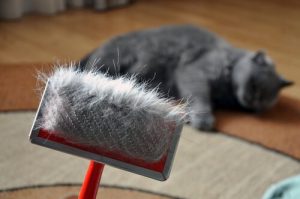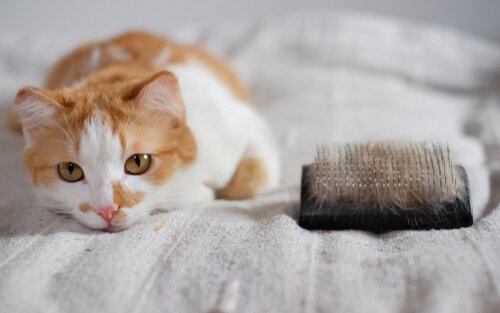The Dangers of Shedding in Cats

Shedding is part of a cat’s natural life cycle. You can’t prevent it from happening, but you can take precautions and avoid problems that can arise from it. Shedding seasons can cause your cat a lot of issues. So, read this article to find out why they’re troublesome and how to prevent any problems from occurring.
What are the Dangers of Shedding in Cats?
Whether your cat has short or long fur, he’s likely to lose a lot during shedding season. Cat fur will appear in the most unsuspected places, even on things your cat doesn’t come close to touching. Even then, there will still be a considerable amount of loose fur on his body, which can be dangerous depending on how he handles it.
As you are probably well-aware, cats are self-sufficient as far as hygiene is concerned. They will lick all the loose fur off their bodies, and the fur will end up in their stomachs. The fur then clumps up into hairballs and cause the cat to cough them up. However, sometimes cats aren’t able to cough the hairballs up.
Since hairballs can cause a lot of problems for cats, you can read this article to be aware of the different levels of care that a cat needs while it’s shedding.
Why are hairballs dangerous for cats?
Hairballs can cause constipation, gastritis, tract obstruction or intestinal paralysis. These are very serious issues that can severely harm your cat.

Not all cats produce hairballs. They usually appear only when cats are constipated or are otherwise having digestive problems. Even if you are very aware of your pet, this issue is still difficult to detect.
Even if your cat having bowel movements, it’s almost impossible to tell if he’s relieving himself enough. When cats do not defecate properly, the fur begins to build up and in turn causes those dreaded hairballs to form.
Cats get rid of hairballs by coughing them up, so take your cat to the vet right away if you see this happening.
How to Make Shedding Season Easier on Your Cat
As mentioned earlier, even if you are really aware of what is happening to your pet, certain factors can easily be overlooked. However, there are several things you can do to help your cat avoid having the problems that arise from shedding.
- Be cautious. It probably would not be a bad idea to collect a sample of your cat’s stools and take it to the vet for testing. You could also request an intestinal analysis. These tests can reassure you and the vet that your cat’s digestive system is functioning properly and avoid any major problems that are related to hairballs.
- Brush your cat on a daily basis. Regardless of whether it is shedding season, brushing your cat on a daily basis will help get rid of any loose or dead fur. In turn, this will reduce the risk of him ingesting it and developing any digestive problems.
- Purge your cat. If you believe your cat may have hairballs, even despite all of your effort to keep them at bay, there are several natural herbs that can help your cat expel them. Ask your veterinarian which one he/she recommends.
- Pay attention to your cat’s diet. Remember that a healthy diet improves bodily functions. Even though a healthy diet won’t get rid of your cat’s hairball problem, it can definitely alleviate it.
Hopefully, this article has provided some useful information regarding this issue because most people don’t realize how harmful hairballs can be for cats.
Just by giving a little extra attention, patience, and care to your cat, you can do a lot to prevent shedding season from harming your him.
This text is provided for informational purposes only and does not replace consultation with a professional. If in doubt, consult your specialist.